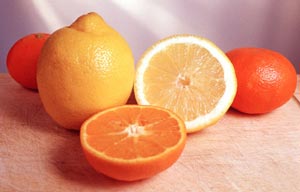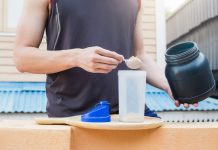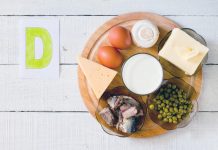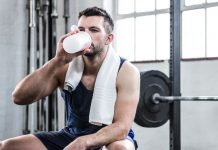Vitamins B and vitamin C are water soluble vitamins. Water soluble vitamins are not stored in our body.
They are kept in our kidneys and excreted out in the form of urine when not needed.
As these vitamins are not stored in our body, you have to maintain and supply water soluble vitamins to the body regularly.
The water soluble vitamin is absorbed into our intestine, passes directly to the blood, and is carried to the tissues in which it will be utilized.
The water soluble vitamins we eat are very sensitive, so cooking, and improper storage can easily eliminate the nutritional value.
The fruits and vegetables which contain these vitamins should be consumed in raw or boiled in less water and should not be stored for more than two days.
Water soluble B complex vitamins are vitamin B1 or thiamine, B2 or riboflavin, B3 or niacin, B5 or pantothenic acid, B6 or pyridoxine, B12 or cobalomin, folic acid, and biotin.
Water soluble vitamins:
Thiamin or vitamin B1:
Thiamin is a water soluble vitamin. Excess intake of thiamin is excreted from the body as it is not stored in the body. This is easily destroyed by cooking. It is necessary for normal functioning of nervous system, stabilizes the hunger, promotes growth, and helps in energy metabolism.
Deficiency of thiamin causes weakness, weight loss, fatigue, insomnia, and nerve damage. Thiamin is found in wheat germ, cereals, fish, milk, whole grains, water melon, and potatoes.
Riboflavin or vitamin B2:
Riboflavin is water soluble vitamin, not stored in the body and excreted out from the body. This is also destroyed in cooking. It is essential for growth, carbohydrate, protein, and fat metabolism, promotes smooth skin, and helps in the formation of red blood cells.
Deficiency of riboflavin causes dry and flaky skin, skin rash, itching eyes, digestive problems, and cracks in mouth and lips. It is found in soybeans, egg, milk, yogurt, broccoli, peanuts, and cereals.
Niacin or vitamin B3:
Niacin is water soluble vitamin, not stored in the body and excreted out from the body. This is destroyed in cooking. Niacin helps in reducing cholesterol levels in the blood, maintains nervous system, reduces blood pressure, improves circulation, maintains healthy skin and digestive system and essential for protein, fat and carbohydrate metabolism.
Deficiency of niacin causes muscle weakness, irritability, loss of hunger, diarrhea, headache, and memory loss. Niacin is found in liver, salmon, beef, fish, brown rice, peanuts, eggs, soybeans, and legumes.
Pantothenic acid or vitamin B5:
Pantothenic acid is water soluble vitamin, not stored in the body and excreted out from the body. This is destroyed in cooking. It improves body resistance, converts proteins, fat and carbohydrates to energy, and it fights infections by building antibodies.
Deficiency of pantothenic acid causes infertility, irritability, depression, weakness, fatigue, and skin abnormalities. It is found in avocado, milk, soybeans, eggs, liver, sweet potato, chicken, yogurt, broccoli, wheat germ, cereals, and oranges.
Pyridoxine or vitamin B6:
Pyridoxine is water soluble, not stored in the body and excreted out from the body. This is destroyed in cooking. It is essential for normal growth, helps in the formation of antibodies, helps in maintaining proper balance of potassium and sodium, and helps in the formation of red blood cells.
Deficiency of pyridoxine causes nervousness, anemia, fatigue, hair loss, dermatitis, flaky skin and nerve dysfunction. It is found in meat, almonds, pork, chicken, wheat germ, spinach, egg yolk, potatoes, cereals, brown rice, fish, soybeans, and legumes.
Cobalomin or vitamin B12:
Cobalomin is water soluble. Unlike other vitamins, it is stored in the liver. It comes from the animal products. It increases energy, helps in the formation of red blood cells, essential for protein, fat and carbohydrate metabolism, helps in calcium absorption and maintains central nervous system.
Deficiency of cobalomin causes nerve damage, weakness, poor hunger, pernicious anemia and fatigue. It is found in chicken, milk, liver, beef, egg, salmon fish, and cereals.
Vitamin C:
Vitamin C or ascorbic acid is water soluble, not stored in the body and excreted out from the body. This is destroyed in cooking. It acts as an antioxidant and protects the body by attacking free radicals in body fluids. It helps in the formation of collagen, helps healing wounds and fractures, and it is necessary for healthy teeth, gum, and bones.
Deficiency of this causes scurvy, swollen or painful joints, nose bleeds, improper digestion, and slow healing of wounds and fractures. It is found in oranges, broccoli, papaya, pineapple, strawberries, tomatoes, Brussels sprouts, spinach and grapefruits.










